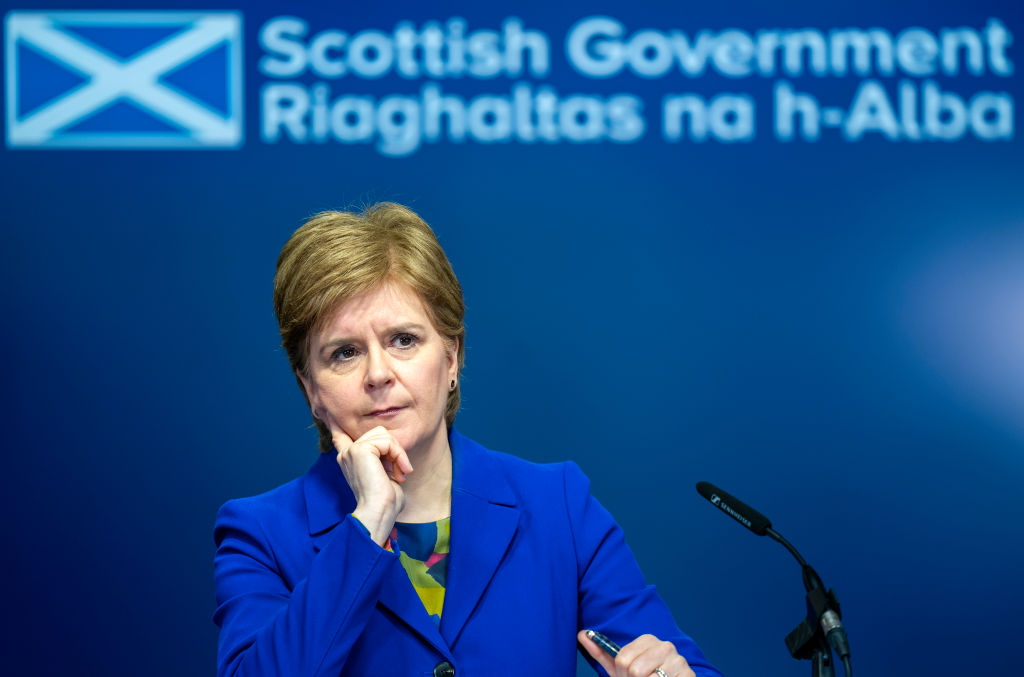It is vanishingly rare for the SNP-supporting paper The National – a publication that makes Pravda look like the Washington Post – to place anything remotely critical of Nicola Sturgeon on its front page. Yet on Wednesday it warned that the Dear Leader’s ploy to turn the 2024 general election into a ‘de facto referendum’ could ‘Blow It For Indy’. It is right. The idea looks like being about as popular as placing rapists in a woman’s jail.
The plan, unveiled by the First Minister in high dudgeon last November, after the Supreme Court rejected her bill to hold an ‘advisory’ referendum on independence, was to present Scottish voters with a one line manifesto before the next Westminster vote in or around 2024. That line would declare that Scotland should be an independent country. That’s it. No policies on health education or the like – just independence. If the SNP wins a majority in this de facto referendum, Ms Sturgeon would regard it as a mandate ‘to open negotiations on independence with the UK government’.
It was soon pointed out that not only was this undemocratic – instructing the electorate how to vote – but also destined to fail.
Initially, Nicola Sturgeon’s deputy, John Swinney, told the BBC that a ‘majority’ meant a majority of seats. He was corrected later that day by the FM. It means a majority of votes: 50 per cent and over. A monumental task in a first-past-the-post election. The SNP didn’t break the 50 per cent barrier even in the ‘tsunami’ general election of 2015 (here, they won 56 out of 59 MPs).
It was soon pointed out that not only was this undemocratic – instructing the electorate how to vote – but also destined to fail.
Moreover failure to reach this barrier would of course be interpreted by Westminster as a failed second independence referendum since, well, that’s what the First Minister said it was. More than failure, it could be a disaster like the failed second independence referendum in Quebec in the 1990s. There are lessons to heed from this: the independence movement there never quite recovered.
MPs in Westminster began to shift uneasily in their seats since they are in the front line of this kamikaze assault on the UK constitution. There was much grumbling about where this concept sprang from. The new Westminster leader Stephen Flynn made known his coolness towards the idea.
Even if by some miracle the 50 per cent barrier was breached it would still be constitutional nonsense. Who would Ms Sturgeon negotiate separation with? The UK government would reject the legitimacy of this wildcat vote on the grounds that it is impossible to know whether Scots were indeed voting for secession. They might just have been expressing their contempt for the government in Westminster which is what they normally do. Keir Starmer has rejected the idea as strongly as Rishi Sunak.
And don’t even think of taking it to the Supreme Court, which has already ruled that the only legitimate referendum is only one which is authorised by Westminster under a so-called Section 30 order. Bizarrely, Ms Sturgeon has herself always argued in times past that only such a Section 30 order would put the referendum ‘beyond legal challenge’. International bodies like the European Union would refuse to recognise any contrived exercise in consultation, just as they did the Catalan referendum in 2017.
Now the former SNP defence spokesman Stewart McDonald and the former MSP Alex Neil have produced a paper comprehensively rejecting the idea. There is to be a special SNP conference next month at which it is expected the de facto referendum will be laid to rest.
Noting the way the wind is blowing, Nicola Sturgeon has suggested she might go along with a new Plan B. This is to turn the next Scottish Parliament elections in 2026 into a de facto referendum instead, after which negotiations will commence. But this doesn’t make a great deal of sense either.
The independence parties already have a majority in Holyrood. That is why they backed last year’s Referendum Bill – the one rejected by the Supreme Court. What good would pretending that the next Holyrood elections are a referendum do?
Indeed, given the current state of Scottish opinion on a whole range of issues, from botched ferry contracts to the chaos in the Scottish NHS, voters might decide it is time to give the First Minister a bloody nose. By 2026 the SNP will have been in government for nearly two decades. Yet the performance has been dismal with faltering growth, persistent poverty, poor educational performance – and that’s not to mention the transgender row.
Around 2025, there has been a suggestion that gas boilers are supposed to be scrapped in Scotland by order of the SNP’s coalition partners, the Greens, who seem increasingly to be running the shop. The estimated cost of decarbonising Scotland’s homes is set at £33bn with very limited public money to finance it. A gas backlash in 2026, on top of any number of other issues, could make a de facto Holyrood referendum as risky as a Westminster one.
There is a whiff of Zimbabwe about hijacking elections and instructing voters what to vote on. Parliamentary elections are supposed to be about broad policies and the government’s effectiveness in implementing them. It is the height of constitutional arrogance to turn them into a plebiscite. Nicola Sturgeon’s legendary popularity is now falling following the trans row. This could take it to the depths.







Comments